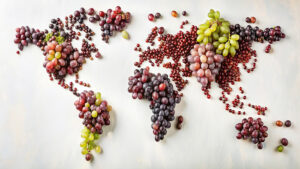
The word “tannin” may not be a part of everyday life, but it is often used when tasting red wine. After reading this article, you will understand what it means when someone says a wine is “extremely tannic”, or that after 20 years of ageing, “the tannins became soft!”
 What is tannin?
What is tannin?
Tannins are molecules present in grape skins and seeds. These molecules have the ability to react with proteins in your mouth’s saliva during tasting. The tannins precipitate during this reaction, giving wine a certain roughness.
The role of tannins
Tannins play an important role in a wine’s mouth feel, providing structure to a red wine, which can range from fine to rough.
What makes you taste more or less tannins in wine?
Tannins are extracted during the winemaking process and the winemaking style greatly affects the quantity and quality of tannins found in red wine. Longer and more intense contact between the juice/wine and the grape skins and seeds results in more extraction. Punch-downs and pump-overs can be used to increase extraction, breaking the cap and mixing the skins with the juice/wine.
So the winemaker “makes” the tannins?
No, not at all. Aside from winemaking technique, tannins also depend on cultivar, with some varieties such as Cabernet Sauvignon containing a lot of tannins, while others like Gamay contain very little.
Furthermore, it depends on the maturity of the grapes. Unripe grapes produce particularly rough and astringent tannins, leaving your mouth dry when spitting or swallowing the wine. In fact, tannins need a lot of saliva to precipitate and create the feeling of dryness, and this depends on the amount of tannin present.
How to evaluate tannins
Grape variety, maturity and winemaking processes help us to estimate the quantity and quality of tannins perceived during tasting. While this can range from silky and smooth, to rough and astringent, it is important to focus on the structural role that tannins plays. In general, a great wine will be produced delicately and with refinement, never having too pronounced tannins.
Do tannins change over time?
Yes! Tannins are generally quite prominent in younger wines and become more rounded and sofer over time. Wines from Bordeaux are very tannic, making them particularly suited for long-term ageing. As the tannins become softer as time passes, the wine becomes more enjoyable. There are limits, off course, and a wine that has rough and astringent tannins in its youth, won’t ever become as soft as velvet.
Visit iDealwine.com



